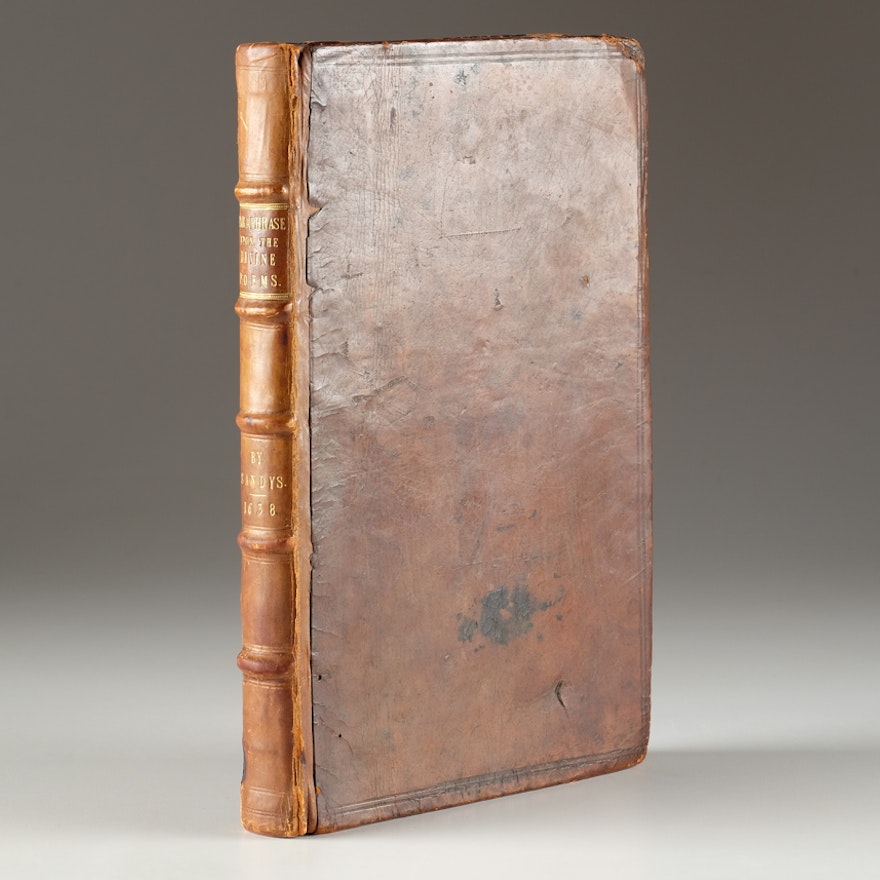Rare 1638 "Paraphrase on the Divine Poems" by George Sandys
Item Details
A 1638 edition of A Paraphrase Upon the Divine Poems by the poet and celebrated translator of Ovid, George Sandys (1578-1644), with musical settings for some poems by Henry Lawes (1596-1662).
The Oxford Dictionary of National Biography writes of this 1638 edition, ‘A second edition of the Psalmes appeared in 1638, which also included fine translations of the book of Job, Ecclesiastes, and Lamentations, and commendatory poems from brother-poets Henry King, Sidney Godolphin, Thomas Carew, and Edmund Waller. The mood of this second edition is more sombre: several of the poets, including Sandys himself, meditate upon the growing troubles of the kingdom. Musical settings of the Psalmes by Henry Lawes were also included, probably for performance by the Chapel Royal.’ The volume also includes dedicatory verses by Sandys addressed to the king and queen.
This volume is in its original leather binding, with tooled boards, gilt lettering, and five raised bands. A colophon at the back states ‘London, Printed by Iohn Legatt, 1637.’ (John Legatt, or Legate, was printer for the University of Cambridge at this time.) An insert at the front states that the book was given in 1952 to a William Christopher, evidently for his contribution to the choir of St. Peter’s Parish in Baltimore.
A handwritten note in black ink on the title page for the new translations of Biblical passages reads ‘John Wollman, 1799.’ This would not be the prominent Quaker preacher John Woolman (1720-1722), but perhaps a relative. Another possible and tantalizing reading of this inscription would be ‘John Coltman,’ one of two hosiers by that name in Leicester, one of whom was related to a Captain Coltman who served with George Washington, and another John Coltman (1750-1808) who in 1780 authored the book Every Man’s Monitor, Or the Universal Counselor in Prose and Verse, a collection of religious maxims, who was reputed as a ‘first rate classical scholar’ and bibliophile, and is discussed at length in William Gardiner’s memoir, Music and Friends: Or, Pleasant Recollections of a Dilettante. Adding weight to the latter supposition are some handwritten notes interspersed throughout the book which evidence a rather well-read note-taker. One note, penciled in a round 18th century hand, offers a quote from English music historian Charles Burney (1726-1824) on the empty space opposite the title page for the Psalms: ‘Psalms put into better verse than they have ever appeared in before or since.’ There also appear at least two notes penciled in the margins in a similar hand, including an alternate translation on two lines of Psalm CXVIII by Elizabeth Tollet (1694—1754).
About the Authors
George Sandys was a traveler and English colonist in America, and a much esteemed poet. Pope declared that, “English poetry owes much of its present beauty to Sandys,” while Dryden called him ‘the best versifier of the former age,’ (which was no mean compliment, considering that this was the age of Sidney, Webster, Chapman, Marlowe, Spenser, and Shakespeare.) Prior to writing the present volume, Sandys was most well known for his translation of Ovid’s Metamorphosis, and for his Relation of a Journey Begun Anno Domini 1610, which tells of his journeys through Europe and the Middle East. In 1624, Sandys was appointed as colonial treasurer for the Virginia Company, and he sailed to Virginia with its new governor, Francis Wyatt. (Wyatt is among those who have contributed epigrams to the present volume in addition to the above-named poets, along with another Sandys acquaintance in the Great Tew circle, Lucius Cary, Second Viscount Falkland.) Sandys’ paraphrases from the Old Testament and the Psalms, as with his translations from Ovid, are written in heroic couplets of the highest quality.
Henry Lawes, according to The Encyclopaedia Britannica, was ‘one of the chief court musicians of that time,’ to whom much credit is due for his facilitating the production (and musical accompaniment) of Milton’s Comus. Milton praises him highly in Sonnet 13, which he addressed ‘To Mr. H. Lawes, on his Aires.’
Condition
-The leather cover is worn at the edges and the raised bands.
-The hinges show wear, but aside from some slight (3 mm) separations at the head and tail of the spine, are fully attached.
-The page edges have only minute deckling and tears, but are very well preserved given the age of the book.
-Various more modern explanatory notes have been written and taped inside the cover, but not in the main body of the book.
Dimensions
Item #
15CIN344-949
Additional Information
Rev. Richard Hooper introduction to the poetry of George Sandys, Dictionary of National Biography entry for George Sandys, Encyclopaedia Britannica Discussion of Henry Lawes and Milton's Comus, Milton's Sonnet 13, "To Mr. H. Lawes, on his Aires"














































